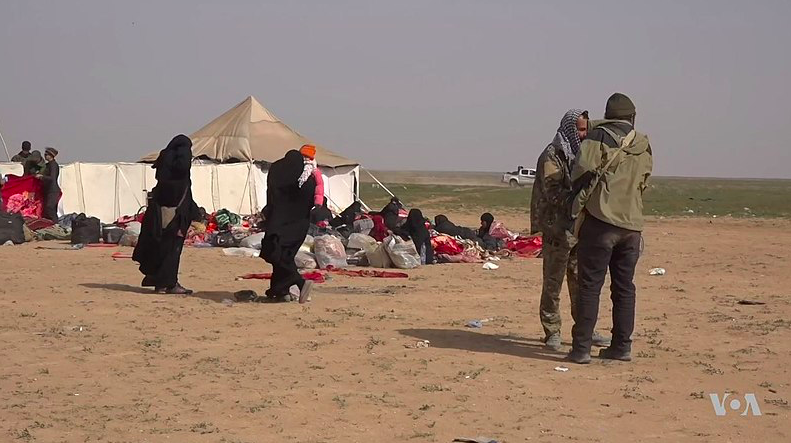As Turkey crossed the border and attacked the Kurdish held section of Syria, the fate of ISIS members detained in the region remains uncertain. Some European nations are using the fragile ceasefire to bring them back. The Dutch Public Prosecution Service (OM) wants to bring back 29 Dutch-Syrians to try them for terrorism in the Netherlands.
Before we talk about possibly bringing back these ISIS members, let’s have a good look at the latest state of affairs.
On October 17th the US negotiated a five-day ceasefire with the Turkish government. Turkish president, Erdogan, celebrated the deal, while Trump tweeted it was “a great day for civilization.”
Trump announced yesterday that the ceasefire would be made permanent while lifting sanctions against Turkey, but this information should be taken with a grain of salt, given Trump’s track record on creating consistent foreign policy.
Nevertheless, the international outcry over the invasion continues. After all, 11,000 Kurds died fighting against ISIS, with the Syrian Democratic Forces (SDF) being America’s most important ally in the fight against the spread of terrorism in the region. Now, they are left on their own to fight against Turkey.
Before the end of the ceasefire, the Turkish and the Russian presidents met for marathon talks in Sochi and agreed on a deal that would establish their power in Syria. Under the agreement, forces from both countries will be deployed across most sections of the northeastern border between Syria and Turkey in order to fill the void left by the sudden withdrawal of U.S. forces.
Turkey will control the areas on the Syrian border captured during its invasion. Russia and Syria will oversee the remainder of the border region. No provisions have been made for an autonomous territory for the Kurds at this point. Russian and Syrian forces would be deployed immediately in order to certify the Kurdish retreat 30 km from the border within the granted 150 hours, as per the Russian and Turkish deal.
President @realDonaldTrump just announced a major breakthrough toward achieving a better future for Syria and the Middle East. pic.twitter.com/rjykmSmdWw
— The White House (@WhiteHouse) October 23, 2019
As the Kurds spearheaded the fight against ISIS in Syria, they hold in improvised prisons and camps 11,000 ISIS fighters and many more thousands of their wives and children. The United States’ Department of Defence estimates that 800 of those fighters are European. Since the US military withdrawal that paved the way for Turkey’s invasion, the escalating chaos in the area has raised the alarm about the fate of those ISIS members.
Because of the Turkish invasion, reports say almost 800 detainees from one prison escaped, among them ISIS members. NGOs said the ISIS members from this camp were not radicalized, but as the region heads for the unknown who knows which detainees will go free next?
Attempts to retrieve women and children
A huge policy impasse for western nations with foreign fighters, women and children held in Syria, there was never a clear answer about what do to with them. However, things might be turning now.
Belgium has contacted the families of the detainees to let them know the government was trying to use the ceasefire to bring back Belgians with links to the terrorist group. France and Germany are also investigating alternatives to take advantage of the time window to bring back women and children.
Will the Netherlands follow the example?
In September, the Dutch Justice Minister Fred Grapperhaus told parliament in The Hague that the Netherlands decided against repatriating women accused of joining ISIS and their children. According to Grapperhaus, the ministers are also concerned about the living conditions of the women and children, but it was ultimately their decision to join ISIS and call Syria home.
'Er wordt een nieuwe oorlog rond deze kinderen uitgevochten en de uitkomst is onzeker. De kinderen moeten daar weggehaald worden voor het te laat is', schrijft @Kinderombudsvrwin in @nrc over de kinderen in Syrische kampen. https://t.co/DtC0dmAyX3
— de Kinderombudsman (@Kinderombudsman) October 15, 2019
In January, the Dutch Ombudsman for children, an independent institution that checks if children’s rights are being respected, renewed calls for the government to bring back the children. “The development of these children has been seriously threatened by their parents’ choices,” the ombudsman declared. “If parents cannot protect their children, the government should step in.”
Dutch Public Prosecution Service wants to bring 29 Dutch-Syrians back
On Wednesday evening, the Dutch Public Prosecution Service (OM) revealed that it would like to bring 29 Dutch-Syrians back to the Netherlands for trial: this is almost three times the number it requested earlier in the year. It is not just women and children who are included in this number: the OM also wants to add men to the list, who are currently held in prison camps in northern Syria. All people on the list stand accused of terrorism, reports nu.nl.
The cabinet, however, has not changed its position on bringing these people back to the Netherlands: it does not want to. They would prefer to see the nationality of these Dutch-Syrians taken away, and have them tried in Iraq. The OM has said it “wants to try everyone, but that is only possible if they are out of those camps and come within the reach of the Dutch justice system”.
As the situation has dramatically changed, do you think the Dutch should take a page out of its neighbours’ book? Sound off in the comments!
Feature Image: VOA/Wikimedia Commons



